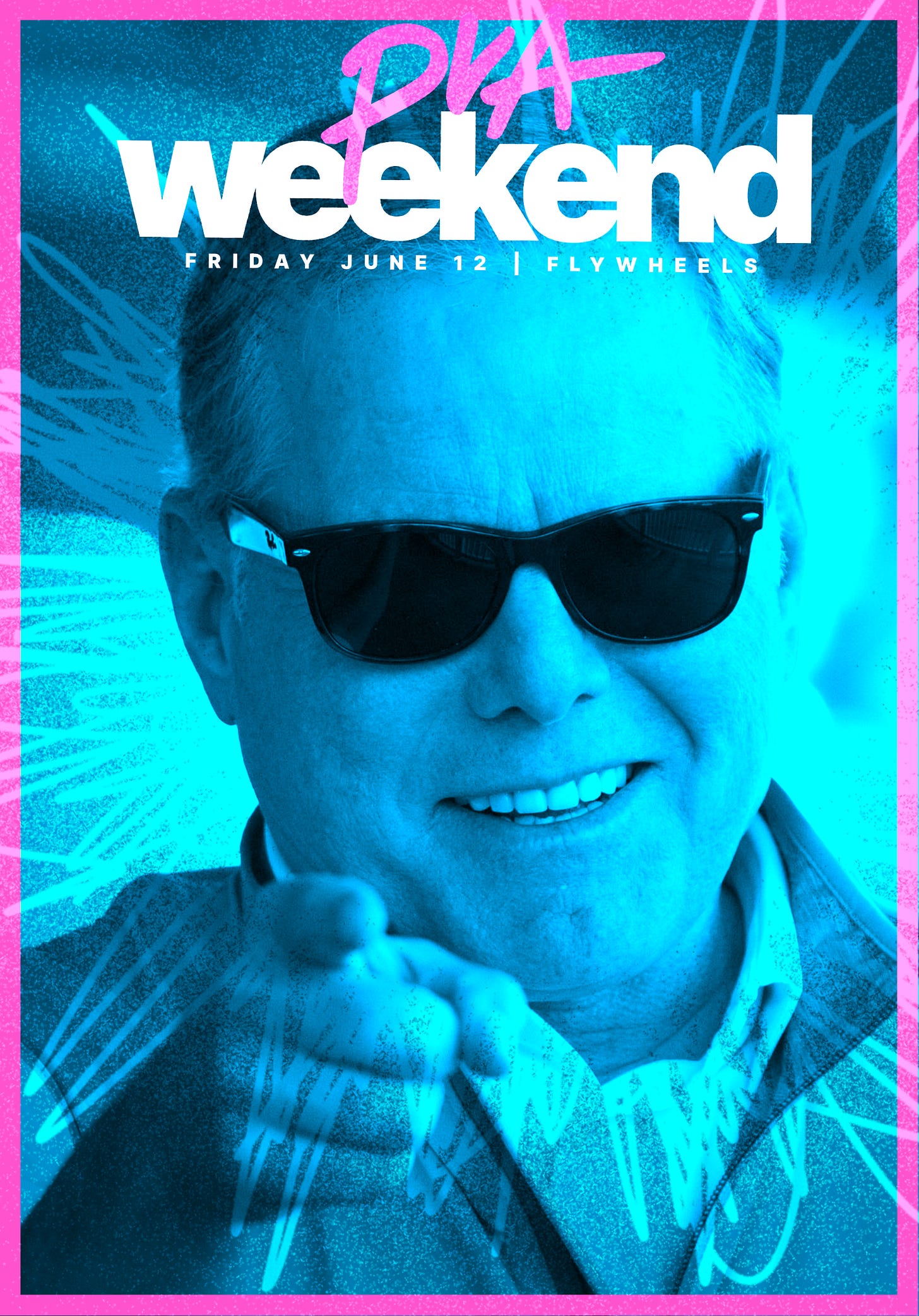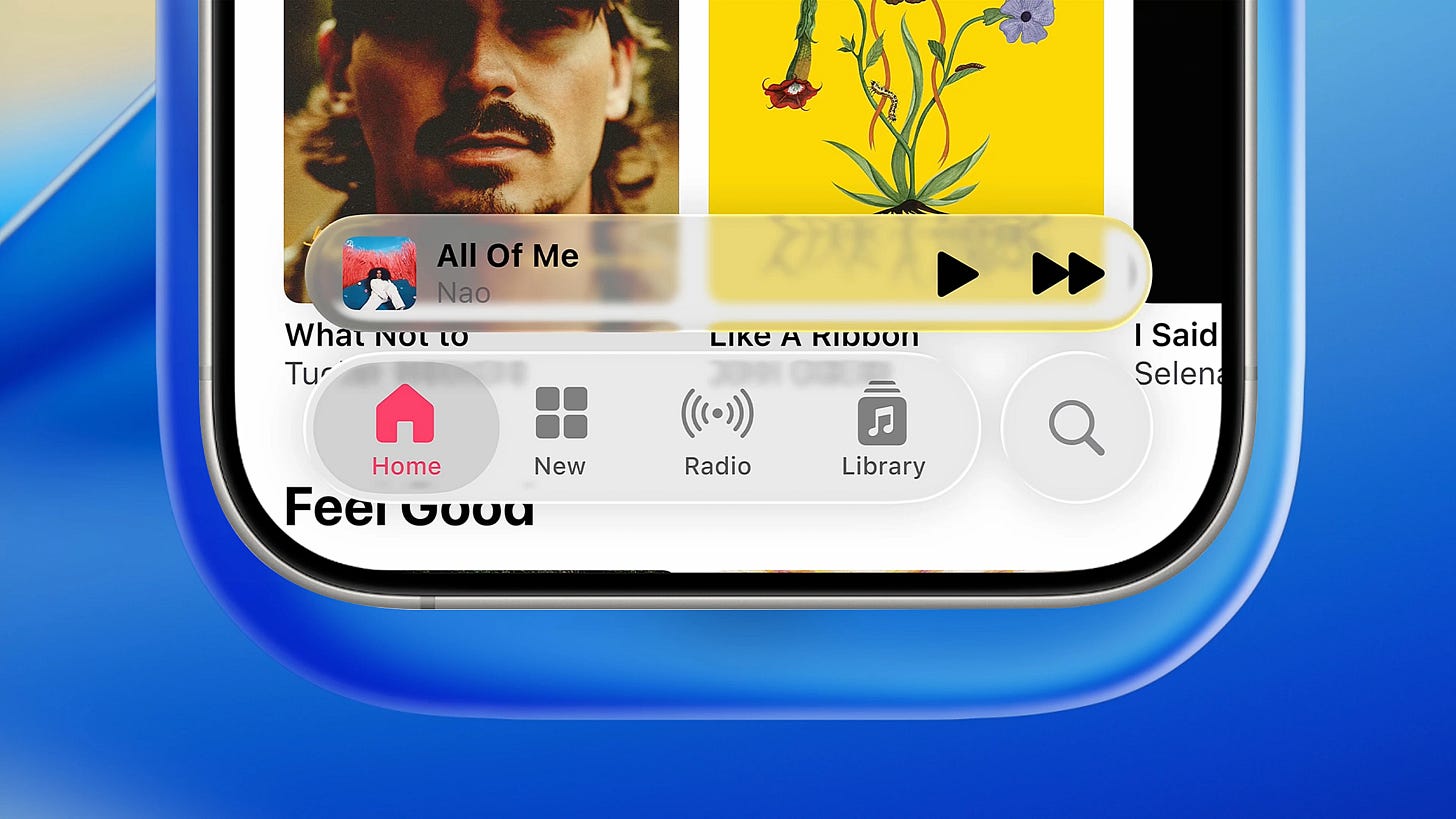Rome is Burning, But My Phone Looks Like Water
Living with contrast. At least my phone looks cool. Defending Zaz. Media's toll fallacy.
POD 138: Liquid Courage
This week, we unpack Apple’s splashy new design language—an ambitious refractive UI system that seems to value shimmer over readability. Alex reviews the “liquid” interface and wonders if anyone at Cupertino actually used the beta outdoors. Plus: a spirited defense of Zaslav as media’s embattled savior, fighting for the spoils of the operator class; the sad saga of the link economy and why publishers are stuck tolling bots for pennies. Also: the gloriousness of popcorn and Coke, Peter Kafka as good product, and renewed appreciation for the Denver airport. Out Friday AM. Listen.
PVA CONVERSATION
"Living is easy with eyes closed, misunderstanding all you see." Lennon–McCartney
Troy: The contrasts are jarring.
Between a grim and unstable present and AI-promise of a better future. It struck me this week as I watched old-fashioned CNN news reporting on riots cascading through major American cities as citizens struggle with the limits of creeping authoritarian power, just after reading optimistic — if mildly cautious —proclamations from AI Jesus Sam Altman on all the good AI things waiting just around the corner. In the ironically titled, “The Gentle Singularity,” Altman writes:
If history is any guide, we will figure out new things to do and new things to want, and assimilate new tools quickly (job change after the industrial revolution is a good recent example). Expectations will go up, but capabilities will go up equally quickly, and we’ll all get better stuff. We will build ever-more-wonderful things for each other. People have a long-term important and curious advantage over AI: we are hard-wired to care about other people and what they think and do, and we don’t care very much about machines.
I love the optimism but it’s hard to see through the present fog. If this is the build up to the Gentle Singularity, it doesn’t feel so gentle. I know AI is gonna change things, but this is as bubbly as I’ve ever seen, especially if a bubble means stuff is gonna worse before it gets better.
Who cares if Siri sucks
It was through this lens that I looked at this week’s Apple WWDC announcements with more optimism than many.
The company announced a sweeping and rushed visual redesign across all platforms called “Liquid Glass” (we discuss in detail on pod - Alex is very bearish) and a bunch of little application enhancements like live translation, call screening, hold assist, chat polls, fancy chat screens, a photo and message app redesign. And… I thought to myself this is not fancy AI shit but stuff I will use. I stare at my phone for hours each day and I am glad you are gonna make it look like water and have fun little UX flourishes and screen for people that bug me. I don’t care if Siri still sucks. I will use ChatGPT for that AI stuff.
Now the Economist may be worried that Apple is the new Nokia but they are probably wrong. If they are not wrong I am super excited to see the new thing that will replace my iPhone the way the iPhone replaced my Nokia.
Returning to the sad state of media
What is more pressing is the real time destruction of much of the media economy as reflected in the last whimpering stages of cable TV and the demise of what we might call the “internet link economy.” Cable has entered the final stages of harvest when dutiful financial people become CEOs. We saw it this week in the split of Warner Bros. Discover wherein the Bros got the good stuff and the Discovery part got sent to the glue factory.
This somewhat boring topic has created some conversation in our Pod chat room including endless indictments of David “Zaz” Zazlav for his feckless management and king size pay package. Far be in from me to defend power but I am taking the other side just because I can't stand to hear Alex and Brian whine about this stuff. Despite all of the noise around HBO / Max brand shenanigans, you’ve got to hand it to the guy. He did what he had to do to leverage a dying business, Discovery, to navigate to the next inevitable thing. And, he has long bullied boards and their comp committees to pay him handsomely.
Without Warner Discovery would be first-rate fucked. In early 2022, the company had a $20B market cap and fading prospects. Zaz found a way to lever up and pull Warner out of AT&T for $43B (AT&T had acquired it in late 2016 for $85.4B plus debt, an EV of about $109B). The asset gave Discovery a streaming lifeline, a transition they could have never made on their own.
Now, facing accelerated cable declines, they can split the assets up again, harvest the Discovery assets and optimize the streamer under the HBO brand. The tax disincentives have expired. The streaming assets have been cleaned up and now make about $1.4B in EBITDA. HBO / Warner will likely not survive inevitable industry consolidation, but it is a very desirable brand, library and international customer base. It’s probably worth 25-30x EBITDA. If profit doubles, it's worth a ton of money. Zaz gets out alive all the while making shit tons of salary and bonus. Power to the managers!
I will not begrudge an operational leader who, year-in-year-out, figures out how to get a bunch of rich shareholders like the Newhouses, and their board stewards to pay him $50M a year. Small investors can look elsewhere or vote against the comp package as they did this time. If the board tires of Zaz’s and his layup “strategic metrics” that govern his $45M bonus, they should fire him and find someone else.
And finally, all media must now be a self-sustaining flywheel
Speaking of gentle singularities… the singularity of a self-sustaining flywheel is what every media company needs to thrive now. I don’t care if you are Netflix, HBO or Waste Management Daily. If the past 20 years have taught us anything, platform reliance is perilous, the precious “link”, once the sustaining mechanic of digital media, is dying at the hands of AI and Google. Your content must be valuable / differentiated / urgent / comprehensive / niche / expert enough such that you can sustain your own distribution flywheel, convert this into something valuable, be it subs or ads, and do it repeatedly. It seems obvious and certainly is old-fashioned media thinking.
Netflix is the canonical example in streaming. People watch Netflix, like people watch Youtube. They are connected to the platform and the show. Netflix got there by being first, by investing in library, by making great tech, by serving the audience, by leveraging others' content until they could get to scale on their own. Now they have the flywheel. Now they are a destination for other people's content. Now they can turn old catalog into new hits.
The same is true for every winning media entity, small or large, be it the FT, the NYT or a successful Substacker. Creators with creator cost structures can exist parasitically alongside a platform and algorithm. Media companies cannot.
Getting to flywheel equilibrium is getting difficult for everyone, especially middling streamers like HBO Max where scale investment is prohibitive and / or you are not part of a new fangled tech-powered bundle like Amazon.
I look forward to going over all of this with you this week.
Alex: Bad News / Good News
Seeing Through Apple’s Liquid Glass
I’m not a fan of the new design language, but that’s neither here nor there. A lot of it will likely be refined, scaled back, or scrapped entirely. The same thing happened with iOS 7 when Apple ditched the skeuomorphic leather for flat design. People hated that too, but it evolved. This will settle over time.
What stands out more is how reactive Apple feels. There’s a sense of scrambling behind the scenes. The one-two self punch of the Vision Pro and the fake AI Siri demo left this event feeling like Apple retreating to safer ground, showing off nice-looking products.
As I said on the podcast, this felt like Apple trying hard to do something only Apple can. The visual effects they’re pushing depend on tight integration between hardware and software. But Apple used to be uniquely good at something else: keeping developers happy. That relationship now feels strained. Even Apple’s typically loyal press wasn’t as glowing this time. There’s a sense of suspicion that I think is earned.
Maybe that’s a good thing. Apple lost its footing trying to chase AI and AR, two areas it didn’t need to lead. It still knows how to make great products and support developers making great products. That will carry them through.
When they Zig, we Zaz
Speaking of great products, my biggest issue with the Zaslov regime is the mismanagement of HBO as a great cultural product. The current changes feel obvious and late. Putting everything under Max and now walking it back shows a lack of vision. AB made a fair point that tax timing might have influenced things, but that doesn’t justify all the wasted time and energy.
HBO is a brand that could still be one of the greats under the right leadership. Maybe Zaslav was the right CEO for a particular moment, but at some point you need someone who understands what it means to build a cultural product.
Maybe I’m being naive. Maybe it’s a good thing. HBO has continued to make good content and being unshackled from the urge to hang on to the ever dwindling cable revenue will mean less distractions. Maybe Apple will buy it.
Nobody Likes the Link
Lastly, some thoughts on the link. A lot of value was built on it. From Yahoo to Google, companies praised the link as the foundation of the internet. But they’ve always treated it as a necessary evil. Instagram removed link functionality early on. Apple fights developers over links to external payments. Social networks like X and Threads suppress link-heavy posts. Google wants to keep you on its pages unless you click an ad. Nobody is trying to save the link. And if your business relies on it, you’re probably in trouble. Outside of being a buy button, links are just exit doors, and no one wants that.
Maybe this is good for the internet. People making websites got consumed with SEO and traffic. Maybe it’s time to just build better products that earn attention because they’re truly useful. Maybe we finally start looking at things like the Fediverse as valid ways to rebuild the interconnected open web.
ANONYMOUS BANKER
The trouble with tolling AI
If you want to read about the WBD deal and its value creation (and destruction), go read Bloomberg. X also has some interesting takes on Zaslav’s executive compensation and the fees paid to consultants.
I want to focus on another topic we covered briefly on the podcast: the proposal to toll LLMs when bots extract publishing content in real time. As consumers increasingly remain inside chat — or agent-based experiences, the idea shines a light on where media companies actually make money and where their real value lies.
The plan to meter real-time LLM scraping treats every article as a licensable asset. That framing ignores how media companies generate revenue. The asset isn’t the text; it’s the audience gathered around that text, then sold to advertisers at an arbitrage (CPM > cost of content). Remove the ad slot, and what remains is wholesale copy worth only a fraction of the value derived from the CPM.
Most online journalism still sits in front of the paywall because those incremental ad impressions beat any plausible per-article fee. When a chatbot surfaces the same piece in its own window, the impression disappears; a micro-royalty can’t begin to replace it. Even if LLM platforms share a slice of their subscription revenue, most of that revenue will fund compute-hungry agent tasks, not publisher payouts.
Media derives value from convening and segmenting attention. Publishers that keep the flywheel: newsletters, events, community, and first-party data, retain proper advertising channels. Those that outsource discovery to chatbots swap a dynamic ad market for a fixed-fee catalog, similar to how music IP is monetized. But text differs from music: while consumers briefly stopped paying for songs during the Napster era, direct payments have long been a core revenue stream for music IP owners.
As we enter the next era of content discovery and consumption, be skeptical of shiny new value-transfer schemes and return to first principles: over extended periods, how has revenue been generated for a specific type of content? The answers are very different for digital content, audio, books, TV, and film.
LINKS FROM GROUP CHAT
NPR remembers funk legend Sly Stone, who died at 81 after a tumultuous life that matched his genre-defying, era-defining music. LINK
Radio-Canada takes aim at open podcasting, proposing a walled garden approach that critics say threatens the medium’s open nature. LINK
ElevenLabs launches v3 of its voice AI, enabling real-time, emotionally expressive speech synthesis across 30+ languages. LINK
Google alums launch a podcast-focused AI assistant, betting that NotebookLM’s successor can become your new cohost. LINK
Private equity firm Roark Capital is buying Dave’s Hot Chicken in a deal valuing the cult chain at nearly $1.5 billion. LINK
The FT profiles Elon Musk’s evolution from tech visionary to political lightning rod, as his influence grows more erratic and polarizing. LINK
Meta is developing fully automated AI tools to generate and test ad creative—no human hands needed. LINK
The FT cautions that private equity is increasingly turning into a money‑trap, as swaths of frothy-era deals now lack viable exits and dampen returns for investors. LINK

Chamath Palihapitiya’s 2024 annual letter is a long, bullish take on capitalism, AI, and how to build long-term power. LINK
Warner Bros. Discovery splits its cable and studio businesses in a long-anticipated move that could set up a sale of HBO. LINK
The NYT details the unraveling of Zaslav’s Max rebrand, with HBO clawing its way back to the forefront. LINK
YouTube’s content moderation is increasingly being outsourced to AI, with mixed results for creators and viewers alike. LINK
Semafor outlines how China is winning the new propaganda war—not with censors, but with savvy message amplification. LINK
Bloomberg reports on Beijing’s influencer charm offensive: all-expenses-paid trips for creators to promote the “real” China. LINK
Puck declares the Warner Bros. Discovery experiment a failure, painting Zaslav’s restructuring as a costly detour. LINK
Apple researchers examine how large language models feign reasoning, revealing the “illusion of thinking” in AI systems. LINK







rome really is burning like why is it so hot outside?!